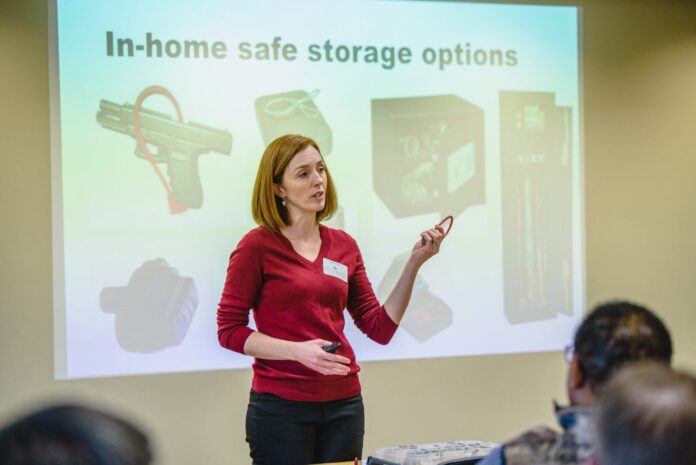Suicides, a leading cause of death in the U.S., account for approximately half of all firearm-related deaths. And over half of all suicide deaths occur by firearm.
For emergency physician Marian “Emmy” Betz, these statistics represent more than numbers. They reflect a crisis she witnesses firsthand. Betz has worked on the frontlines for much of her career, treating hundreds of patients who have been injured by firearms or are at risk of firearm injury. It’s rare to have a patient hospitalized for a self-inflicted gun wound. Betz said most of those victims never make it to a hospital alive.
“A gun is uniquely lethal in a suicide attempt,” Betz said in an interview with PBS. “If someone uses a firearm, unfortunately, about 90 percent of the time, that person will die.”
On Thursday, March 6, Betz will visit the Fralin Biomedical Research Institute at VTC in Roanoke to discuss “Suicide by Firearm in the United States: A Collaborative Path for Prevention.”
Betz is a researcher and professor at the University of Colorado School of Medicine. Through her research, she has found that interventions involving conversations between providers and patients can help prevent suicidal thoughts from becoming suicide attempts. But she has also found that there are limitations to what a lone clinician can do. So Betz began to look beyond the walls of the hospital for opportunities to create community partnerships aimed at saving lives.
Betz recognizes that firearm injury prevention is a politically sensitive topic, but she sees opportunity for evidence-based interventions.
Betz is a founding member of the Colorado Firearm Safety Coalition, an alliance between clinicians, gun shop owners, and firearm trainers. This coalition echoes the work of similar groups in New Hampshire, Tennessee, and South Dakota that provide firearm training resources and guidelines for clinical conversations in times of crisis.
With support from the National Institutes of Health, Betz also helped develop Lock to Live, a free online resource that helps users identify potential hazards in their homes, such as firearms, sharp objects, and medications. Betz said the tool empowers individuals and families to take proactive steps to explore storage options and create a safer environment.
“Dr. Betz has helped create a framework for addressing one of America’s most pressing public health challenges by developing evidence-based strategies that respect both safety concerns and individual rights,” said Michael Friedlander, executive director of the Fralin Biomedical Research Institute and Virginia Tech vice president of health sciences and technology.
“The impact of her work demonstrates that effective suicide prevention requires not just medical expertise, but also an understanding of community values and practical considerations. Her lecture promises to offer insights into how health care providers, firearm owners, and community members can work together to save lives,” Friedlander said. “All communities, including our own, can benefit from learning from Dr. Betz’ insights and experience into this major public health issue. Too often, suicide and gun violence are not sufficiently openly discussed, missing opportunities to make inroads into reducing their incidence.”
Betz has contributed her expertise to White House initiatives across three presidential administrations as well as veterans’ groups nationwide. An elected member of the National Academy of Medicine, Betz focuses on developing practical, nonpartisan interventions for those at risk.
“Our views vary, but nobody wants to lose a family member. Nobody who owns a firearm is okay with a family member dying by suicide,” Betz said. “I think we really need to come back to recognizing that everyone wants their loved ones to stay safe.”
The program begins with a 5 p.m. reception on Thursday, March 6, followed by the lecture at 5:30 p.m. at the Fralin Biomedical Research Institute at 2 Riverside Circle in Roanoke. The lecture will also be livestreamed via Zoom.
Through the generosity of late Roanoke businessman and philanthropist Maury Strauss, the lecture is free and open to the public.
The National Suicide & Crisis Lifeline offers 24/7 support. Call or text 988 if you or someone you know is in distress.
– By Lena Ayuk

